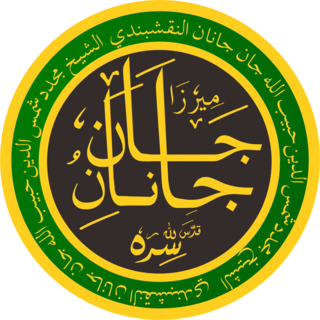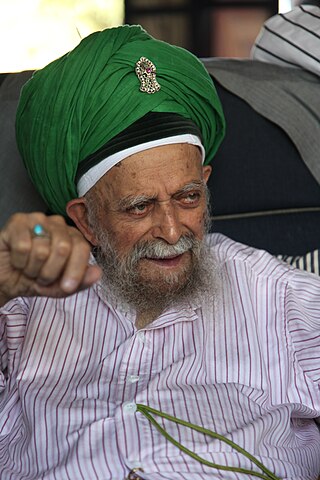Related Research Articles

The Chishti order is a Sufi order of Sunni Islam named after the town of Chisht where it was initiated by Abu Ishaq Shami. The order was brought to South Asia by Mu'in al-Din Chishti in the city of Ajmer.
The Qadiriyya or the Qadiri order is a Sufi mystic order (tariqa) founded by Shaiykh Syed Abdul Qadir Gilani Al-Hassani, who was a Hanbali scholar from Gilan, Iran. The order relies strongly upon adherence to the fundamentals of Sunni Islamic law.

Mirzā Mazhar Jān-i Jānān, also known by his laqab Shamsuddīn Habībullāh, was a renowned Hanafi Maturidi Naqshbandī Sufi poet of Delhi, distinguished as one of the "four pillars of Urdu poetry." He was also known to his contemporaries as the sunnītarāsh, "Sunnicizer", for his absolute, unflinching commitment to and imitation of the Sunnah.
Khwaja Muhammad Tahir Bakhshi Naqshbandi, born 1963), also known as Sajjan Saeen, is a prominent Naqshbandi Sufi shaykh in Pakistan. He was born on March 21, 1963, at dargah Rahmatpur Sharif, district Larkana, Pakistan.

Qadiriyya wa Naqshbandiyya is a Sufi order which is a synthesis of the Qadiri and Naqshbandi orders of Sufism. The Qadiriyya wa Naqshbandiyya Sufi order traces back through its chain of succession to Muhammad, through the Hanbali Islamic scholar Abdul Qadir Gilani and the Hanafi Islamic scholar Shah Baha al-Din Naqshband, combining both of their Sufi orders. The order has a major presence in three countries, namely Pakistan, India, and Indonesia.
Khwaja Haji Dost Muhammad Qandhari was an Afghan Sufi master in the Naqshbandi tradition in the 19th century (1801–1868).

Muhammad Idrees Dahri is an Islamic scholar, preacher, writer, author, poet and researcher of Sindh, Pakistan. He is Hanafi, Maturidi, and belongs to the Naqshbandi Mujaddidi Sufi order and the Barelvi movement of Sunni Islam. He is a khalifa (deputy) of Allah Bakhsh Abbasi Naqshbandi. He also has teaching permissions in Shadhili and Alawi Sufi orders.

Hazrat Mawlana Pir Fazal Ali Shah Qureshi was an Islamic scholar and the leading Naqshbandi Shaikh of colonial India in the early twentieth century. He was born to Murad Ali Shah in 1270 AH in Daud Khel, Punjab, and died at 84 in the first night of Ramadan 1354 AH and was buried at Miskeenpur shareef, district Muzaffargarh, Punjab.
Muhammad Sirajuddin Naqshbandi was a prominent Islamic scholar and Sufi shaikh of the Naqshbandi Sufi order in South Asia. He was born in 1879 and died in 1915 at Mussa Zai Sharif, Dera Ismail Khan. His legacy and influence are still widespread around the world in terms of his followers and his methodology.
Muhammad Usman Damani was a prominent Muslim scholar and Sufi shaykh of Naqshbandi tariqah of the 19th century (1828–1897) in South Asia.
Naqshbandi Tahiri Golden Chain is the spiritual chain of successors of the Naqshbandi Sufi order which descends from Khwaja Muhammad Tahir Bakhshi Naqshbandi commonly known as Sajjan Saeen. The recitation of this golden chain in poetic form is part of the daily practices of a follower in the Naqshbandi Tahiri Sufi order.
A Qayyum is a special spiritual position in Sufism, especially in the Naqshbandi tradition. The term was first coined by Ahmed Sirhindi, who was the first qayyum. According to him, a qayyum is a dignitary upon whom the whole order of existence depends. The word is derived from Al-Qayyum, a name of God in Islam that has the same meaning. According to the doctrine, only one qayyum is alive at any particular time.
Shah Abdullah alias Shah Ghulam Ali Dehlavi was a Sufi Shaykh in Delhi during the early 19th century. He was a master of the Naqshbandi tradition His father wanted to make him a disciple of Qādri,.

Shaykh Muhammad Nazim Adil Al-Qubrusi Al-Haqqani, commonly known as Shaykh Nazim, was a Turkish Cypriot Sunni Muslim imam and one of the most influential members of the Haqqani stream of the Naqshbandi order (tariqa) of Sunni Islam.
The Naqshbandi-Haqqani Golden Chain is the chain of succession of Sufi masters in the Naqshbandi-Haqqani Sufi Order.

Allahabad Sharif, also known as Grand Mosque Allahabad is a mosque and shrine in Kandiaro, Naushahro Feroze District, Sindh, Pakistan. It is located on National Highway 415 kilometres (258 mi) from Karachi. The premises also house an education system up till Islamic University level, a hospital, an old age residence and an orphanage.

Mohammad Baba as-Samasi was a Sufi of the Naqshbandi order. He was born in Sammas, a village on the outskirts of Ramitan, three miles (4.8 km) from Bukhara, Uzbekistan. He memorized the Qur'an and the Hadith, and become an expert in Jurisprudence, then studied Speculative Theology, Logic, Philosophy and History. He followed Shaykh Ali Ramitani. Shaykh 'Ali Ramitani quddisa sirruhu chose him as his successor before his death and ordered all his disciples to follow him.
Karāmat ʿAlī Jaunpūrī, born as Muḥammad ʿAlī Jaunpūrī, was a nineteenth-century Indian Muslim social reformer and founder of the Taiyuni movement. He played a major role in propagating to the masses of Bengal and Assam via public sermons, and has written over forty books. Syed Ameer Ali is among one of his notable students.
References
- 1 2 Jalwa Gah-e-Dost (Urdu) 2nd Edition (2008) by Khwaja Muhammad Tahir Bakhshi Archived 7 October 2011 at the Wayback Machine
